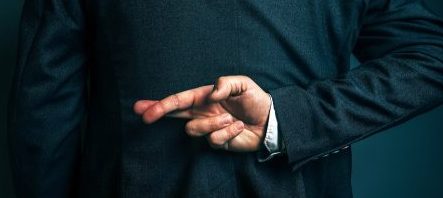A Time Magazine cover asks “Is Truth Dead?” In a world where leaders spin reality using alternative facts to make things seem better than they are, is dishonesty becoming the new norm?
“Morality, like art, means drawing a line somewhere.” ~ Oscar Wilde
When leaders play loose with the truth, they set examples that make it easy for everyone to do the same thing. When we see people successfully getting away with untruths, we start telling our own lies. We call them “our perspective.”
When there are no sanctions, why not? After the financial crisis of 2008, few leaders were punished; and many were let go with multi-million dollar compensation packages. In spite of a leader’s published yet provable falsehoods, we choose instead to focus profitable shareholder earnings.
Dwindling confidence in what our political leaders say has become the subject of late-night talk shows and comedy riffs. New terms for this abound: “alternate facts,” and “fake news.” This is of serious concern to anyone who seeks to make the world a better place.
It seems that power is often achieved by spinning the truth.
“Leaders are, by definition, people in positions of great power. And research consistently demonstrates that ‘powerful people lie more often and with more ease.’” ~ Jeffrey Pfeffer, Leadership BS, Fixing Workplaces and Careers One Truth at a Time, HarperBusiness, September 2015
When we see leaders succeed by lying, we become blasé. Soon, dishonesty becomes less important than achieving results. It’s time we look at ourselves as individuals. Everyone engages in dishonest behaviors, sometimes for good reasons, and often not.
Everyone Does It
Is everyone dishonest, is it human nature? We may engage in and tolerate a certain amount of “fudging.” We almost expect it to happen in business. That’s a different kind of dishonesty that we seem to accept at work, and it’s not limited to a few bad apples.
We fudge expense and time reports, fake doctor’s appointments, and claim we’re ill when out doing something fun. We use our children as excuses for things we don’t want to do. Some of us cheat on our state and federal income taxes.
In an effort to discover the truth about dishonesty, Duke Professor and best-selling author Dan Ariely published The Truth About Dishonesty: How We Lie to Everyone – Especially Ourselves, Ariely asks:
- Is dishonesty restricted to a “few bad apples,” or is it widespread?
- What factors curb dishonesty?
- What are the psychological and environmental forces that influence honesty in our daily lives?
- How do others influence us when it comes to right and wrong?
Everyone engages in dishonesty, some in small ways, some more than others. Everyone agrees it’s wrong, and we easily point to the errors of others. Some of it involves white lies and exaggerations, and is perpetrated against faceless institutions. We tell ourselves it’s harmless and find good reasons to justify it.
But is it really okay? Or does fudging in small ways lead to the slippery slope of fraudulent actions? In this series of blog posts, I aim to explore the issues of truth and dishonesty both on an individual and collective level.
I think we can do better. What’s your opinion? I’d love to hear from you. You can call me at 561-582-6060, let’s talk. And as always, I can be reached here or on LinkedIn.

Did You Enjoy This Article?
Join thousands of other smart business owners like yourself & get our Proffittable Times newsletter.
It's filled with actionable content you can apply immediately.
Sign up now to get started!
– Coach Nancy










